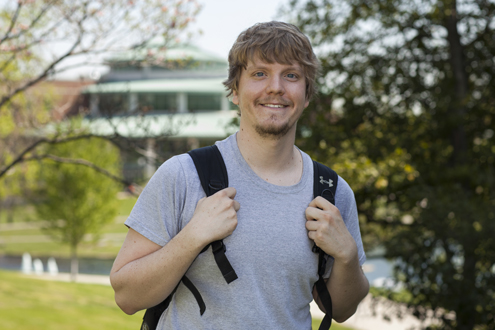
Nicholas Brune, a senior mathematics major, will graduate from UMSL this spring and earn the university’s first Certificate in Actuarial Studies. (Photo by Alicia Hottle-Sippy)
A variety of studies and media outlets agree: the actuarial field is booming even among these tough economic times. A recent analysis put together by CareerCast, a job search portal that says its analysis is a quarter century in the making, states that growth in the actuarial field is set to outpace all other professions. Keeping true to its commitment to prepare students for the changing job market, UMSL now offers a Certificate in Actuarial Studies through the Department of Mathematics and Computer Science. And given the profession’s booming future, it’s perhaps no surprise the first recipient of the certificate, Nicholas Brune, is completing his entire undergraduate curriculum in only three years.
Brune came to UMSL in 2010 knowing that he wanted to be an actuary. Thinking he’d have to carve his own niche within the math and economics programs, Brune went through his first semesters working toward minors in economics and statistics along with his math major. Then, in Brune’s junior year, the Certificate of Actuarial Studies was being developed and the committee behind it actually recruited Nicholas for his input.
“There’s a big need in the Midwest for actuaries right now,” said Ronald Yasbin, dean of the College of Arts and Sciences at UMSL. “And before UMSL only one other school in the area offered any kind of degree in the field.”
But for students like Brune, who is also a student in the Pierre Laclede Honors College, an interest in the actuarial studies extends way beyond the job outlook.
“It’s hard to find a job that encourages the learning process to such a degree,” Brune said. “Some companies might give you a raise to get an MBA, but in the actuarial field it’s really not about the money, it’s about the mathematical concepts that many people have yet to learn. It’s a great opportunity, a great field for someone interested in math.”
Brune says he was fortunate to know early on that math was going to be his chosen field of study, though even as he accumulated advanced placement and college credit math courses at St. Charles (Mo.) High School, he wasn’t sure the exact career those math skills would translate into.
A few months before Brune graduated from high school a teacher brought the actuarial profession to Brune’s attention, knowing that Nicholas wanted to apply math to the financial realm and would probably prefer a career with a stronger interpersonal aspect.
It was that focus carried over from high school that allowed him to get through his entire undergrad so quickly. Though doing so was not without challenges. His very first semester he enrolled in 18 credit hours. This current semester he is enrolled in 19.
“Nicholas is a smart guy,” said Robert Sorenson, a professor of economics. “He had a goal that he had honed in on like a laser. I am sure Nick will be a great standard-bearer of the quality of our certificate program and a very successful actuary.”














